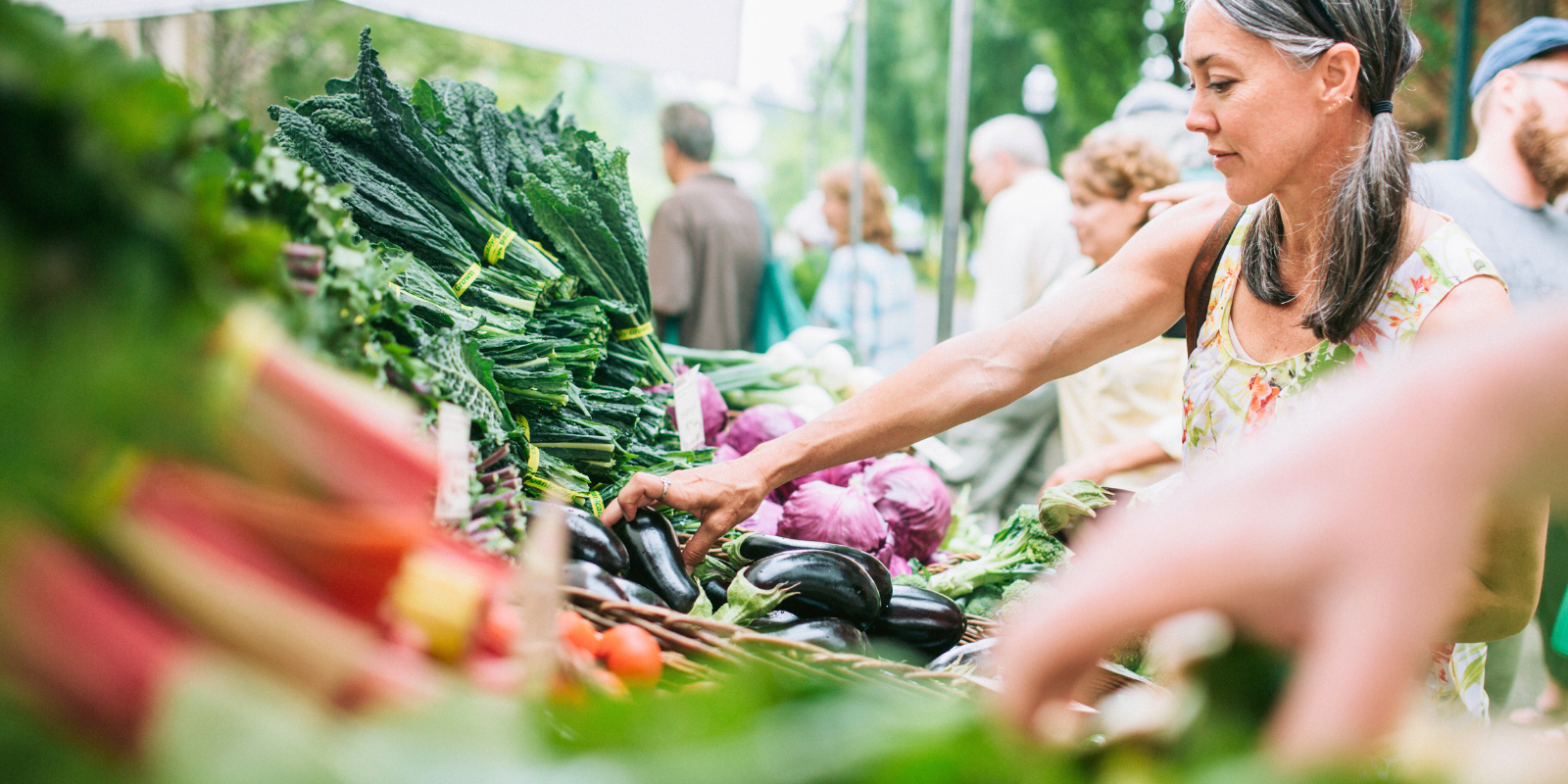What does eating seasonally and locally mean, and how can you do it?
Funk: Eating seasonally and locally means that people buy and consume produce items — like fruits, herbs, and vegetables — that came from local sources and are currently in season in your geographic area. This information is often found online. For example, you can find local food producers and what produce is in season through the Colorado Department of Agriculture’s Colorado Proud website.
What are the health benefits of eating local, in-season foods?
White: We maximize the nutrient profile — higher vitamin, mineral, and phytonutrient content — which supports the immune system, keeps the body in a more anti-inflammatory state, and reduces oxidative stress. We also increase exposure to the beneficial soil microbes which help diversify and strengthen our microbiome (think of it like a natural probiotic boost) to support immunity, digestion, allergies, and even the mind-gut connection.
Healthier soil equals healthier food. Organic and regenerative organic farming practices support the most nutrient-rich, microbially-diverse soils — and that translates directly into the quality of the food we eat.
Seasonal eating encourages dietary diversity. One of the best things we can do for digestive health is to diversify the types of plant-based foods we are eating. Aim for about 30 different plant-based foods per week (fruits, vegetables, whole grains, nuts, seeds, herbs, olive oil, etc.) and rotate produce based on what’s in season.
Many claim that produce tastes better when it is in season. If it tastes better, does that mean it is more nutritious, or is taste not an indicator of nutritional value?
White: Many people say produce tastes better when it’s in season — and while “better” is subjective, there’s truth to the idea that stronger, more vibrant flavors often reflect higher nutritional value. When a plant grows in its natural region/season, it tends to develop a more robust flavor and richer nutrient profile. The color of produce often corresponds with both taste and nutrition as well — for example, deeply green kale is more bitter (and nutrient-dense) than pale iceberg lettuce.
Local, in-season produce usually delivers the most vibrant taste because it’s harvested at peak ripeness and hasn’t spent days in transit. In contrast, produce picked early or grown out of season often lacks both full flavor and nutritional depth — think of a homegrown tomato versus a store-bought one.
Are fresh fruits and vegetables the more nutritious option compared to frozen or canned produce?
Funk: Frozen fruits and vegetables offer a lot of nutritional value, because when those items were harvested, they went through a flash-freeze process — so their nutrients are essentially frozen in time. If you bought a peach at the farmers market and waited a week before you actually ate it, then a frozen peach could end up being the fresher and more nutrient-dense option of the two.
I believe canned produce would be a little less nutritious because some of the nutrients will leach out into the water. For example, if you drain the liquid from a can of green beans and only consume the beans, then you will lose some of those nutrients that were in the liquid. However, canned foods can still offer nutritional benefits, so they still have a place in people’s diets.
If food producers modify their produce items to keep them shelf stable for longer periods, could those modifications impact gut health?
White: Most likely, to some degree. Fresh, local produce often carries environmental microbes that help diversify and strengthen the gut microbiome — acting almost like a natural probiotic. But when produce is heavily sanitized or treated for extended shelf life, that microbial exposure is significantly reduced.
Years ago, we were taught to fear all bacteria — scrubbing fruits and veggies thoroughly, even with soap. But now we know that many microorganisms are beneficial, especially those from healthy, diverse soil. Rinsing off excess dirt is still a good idea, but there’s no need to scrub or peel away every trace of nature.
That said, choosing produce grown with organic or regenerative organic practices is especially helpful for gut health. These methods promote a richer diversity of soil microbes and reduce reliance on herbicides and pesticides. (Tip: Visit your local farmers market and chat with the growers — many follow these practices even if they’re not “certified organic” due to the high cost of certification).
When crops are genetically engineered for traits like long-distance shipping or size, it may compromise phytonutrient density — which plays a key role in supporting gut and overall health.
While some genetically modified organisms are designed to reduce pesticide use by resisting pests, others are modified to tolerate more herbicides like glyphosate (such as RoundUp products), leading to increased herbicide application. This can negatively affect soil biodiversity, insects, and water quality. GMOs are also commonly grown in large-scale monocultures — growing one crop over vast areas — which further depletes soil health and microbial richness, which can ultimately impact the integrity of the food we eat.
Overall, what should people do to best support their gut health?
Funk: We recommend eating a variety of plant-based foods. There is no specific guide for how often someone should change the fruits and vegetables they are eating. I usually recommend changing it up every two weeks, but it depends on the person. Consider your budget and don’t feel the need to buy a bunch of new foods at once. Incorporating just a few new items into your diet can be a great start.
Fiber is also important. The general goal we give people is to eat 25-35 grams of fiber, depending on the person. It’s also beneficial to consume different types of fibers. For example, apples and kiwis have soluble and insoluble fiber, while potatoes have a special type of fiber called resistant starch that is good for the gut. Other things to keep in mind are limiting the amount of added sugar and ultra-processed foods you are eating. Lean into eating protein, healthy fats, and fermented foods like pickled vegetables, as those are good for your gut health.
Remember that it’s not just your diet that affects your gut microbiome. Regularly exercising, managing your stress, and getting adequate sleep are also important habits to maintain.
Often, there is a lot of messaging about food that makes us feel like we’re not doing the right things, and it can negate the efforts we are making. Consider where you’re at, what you want to improve, and know that through these efforts, you are bettering your health.
White: I second everything Sarah mentioned. When possible, choose local, organic/regenerative organic, wild (such as wild fish), and in-season produce (this includes frozen and canned options too as long as they don’t have high amounts of added sugar or sodium). Minimize GMOs and produce that have traveled a long way. This not only supports gut health, but also sustainable farming practices and the local economy. How can you do this? Sign up for a Community Supported Agriculture (CSA), visit your local farmers market, or start a small garden at home.






